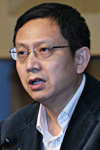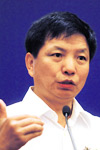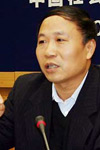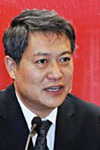|
Fourth, the government should consider how to maintain the continuity of policies on consumption and so on. The continuity of macro policies next year will be reflected not only in the fiscal and monetary policies, but also in detailed policies on aspects such as consumption. These policies include promoting income growth and improving the consumption environment.
Jia Kang: Readjust taxes on resources
 |
|
Jia Kang(FJSEN.COM) |
Jia Kang, Director of the Research Institute for Fiscal Science of the Ministry of Finance, said that at present, when the pressure and impact of previous inflation have ended but future inflation has not yet started, there is an important opportunity to raise taxes on resources.
According to Jia, if the present macro policies could do better in readjusting the economic structure and transforming the economic pattern, it would be better to delay the next round of inflation.
By means of price and taxes on resources, upgrading of the whole industrial chain will be promoted.
Besides taxes on resources, Jia also supports the introduction of a real estate tax. Thus, the real estate market can avoid speculation and develop in a sustainable and healthy way.
When it comes to reform, China should firmly resolve to fight against monopoly, especially administrative monopoly. This can effectively promote optimized and reasonable distribution of resources.
"Anti-monopoly work will inevitably affect some people's vested interests, but 30 years have passed since reform and opening up," Jia said. "We are unlikely to deepen reform without affecting vested interests."
Kong Jingyuan: People-oriented economy as the base
 |
|
Kong Jingyuan(SINA.COM) |
According to Kong Jingyuan, Director of the Department of Economic System Reform at the NDRC, the government is now formulating the 12th five-year plan (2011-2015), by the end of which Chinese economic development will see some significant changes and transitions. For example, China's urbanization rate is nearly 47 percent this year and is growing at an average annual rate of 1 to 2 percent. By the end of the 12th five-year plan, the urbanization rate will have surpassed 50 percent and China will have transformed from a traditional agricultural society that has lasted for thousands of years into a modern urban society. Moreover, China's per-capita GDP will surpass $3,500 this year. By the end of the 12th five-year plan, it will have reached $5,000 and China will have realized the transition from a developing country to a moderately developed country.
However, China must carry out system reform, otherwise it will be unable to adapt to such a significant transition.
The core issue of system reform is reform of the income distribution system. To solve the problem in resource distribution and redistribution, the government should fulfill its responsibilities, including the establishment of a social security network.
Moreover, social management system reform, transformation of government functions, urban management system reform as well as reform of monopoly industries and the state-owned system should all be promoted.
Kong particularly emphasized that a people-oriented economy should be the base of any private economy.
Fan Jianping: Less state-owned capital in competitive sectors
 |
|
Fan Jianping (CHINA.ORG.CN) |
Fan Jianping, Director of the Department of Economic Forecasting State Information Center, said that the government should pay more attention to the quality of economic recovery and focus on further stimulating private consumption and investment.
According to Fan, at present, when actively participating infrastructure construction and livelihood projects, some state-owned capital has entered competitive sectors and squeezed out private investment.
"For example, state-owned enterprises are excessively active in the real estate sector," Fan said. "But they have not become an important force in stabilizing real estate prices. Instead, they have frequently driven up prices at land auctions all over the country by relying on their facilities in obtaining policy support and bank credit, having a bad impression to the public." The number of cases of state-owned enterprises acquiring famous private companies is increasing. For example, the loss-making Shandong Iron and Steel Group Co. Ltd. recently acquired profit-earning Rizhao Iron and Steel Group Co.
Fan holds that state-owned capital should gradually withdraw from competitive sectors such as the real estate industry. Moreover, the government should promote reform of access to monopoly industries. It should introduce competition mechanisms in monopoly industries such as railway, telecommunications, aviation and petrochemicals as well as public service and social development sectors, eliminate unreasonable limits on market access as soon as possible, and encourage private companies to enter these sectors.
Zhang Yuyan: World economy has not yet recovered
 |
|
Zhang Yuyan(YIWU.GOV.CN) |
Zhang Yuyan, Director of the Institute of World Economics and Politics under CASS, said that any celebration of world economic recovery is premature. Rebound and recovery are two different concepts. The world economy has rebounded, which generally means the restoration of growth, but it has not necessarily recovered in the cyclical sense.
The main reason for Zhang's opinion is that the unemployment rates of developed economies are still high. The unemployment rate in the United States is above 10 percent and the situation in the euro zone is equally grim. The high unemployed population will affect consumption levels.
According to Zhang, the net assets of U.S. households have dropped from $63 trillion at their peak to $40 trillion. Such deep changes of fortune will influence consumption in the United States.
Zhang also holds that the losses of the U.S. financial system have not yet been fully disclosed and that the overall system is still fragile. In terms of real economy, the utilization rates of productive capacity in Europe and the United States are still at low levels.
In the whole world economy, all kinds of uncertainties still exist: Labor costs are gradually rising, there is no single industry that can stimulate world economic recovery, and trade protectionism is growing.
"We should pay more attention to the world economic situation, which may help us formulate macro policies," Zhang said.
(Source: China Business News) | 